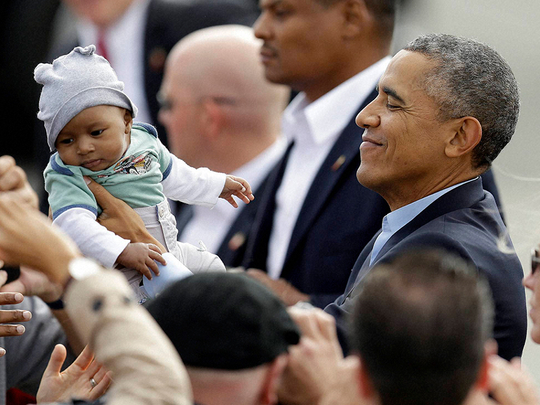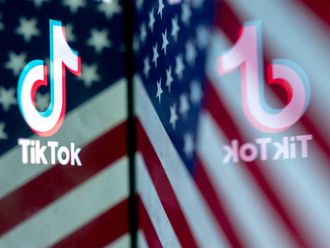
Washington: The major Democratic presidential candidates disagree with President Barack Obama on trade. They think he has not done enough to push for gun control or to overhaul the immigration system. They believe they could do a better job moving legislation through a Republican-controlled Congress.
And on Tuesday night in Las Vegas at the first Democratic primary debate, a new reality will become clear: It’s not Barack Obama’s party anymore.
In the seven years since Obama entered the White House on a wave of excitement, Democrats have developed a complicated relationship with their standard-bearer. And that is especially true for those running for their party’s nomination.
Obama’s legacy and how much a Democratic successor should embrace it will hover over the debate, even as Hillary Rodham Clinton, Senator Bernie Sanders and the other Democratic candidates put forth their specific policy proposals and promises.
“It is an existential moment,” said Jon Cowan, a former official in Bill Clinton’s administration who is president of the centrist think tank Third Way.
“If you stand back far enough entering this debate,” he added, “you’ll see the Democratic Party they’re asking to lead, and there’s no question it has moved to the left.”
Hillary Clinton and Sanders promise different approaches from Obama’s, as much in style as in substance.
Both have suggested they could get more accomplished, although Clinton has done so in more oblique terms. In a podcast interview with former Obama strategist David Axelrod, Sanders implied that the president had been naive to think Republicans would sit down with him.
“I think it took the president too long to fully appreciate that,” Sanders, I-Vt., said.
Last week, Clinton told Telemundo that Obama’s mass deportations were “part of a strategy” to get congressional Republicans on board with a comprehensive immigration overhaul and that the “strategy is no longer workable.”
A theme likely to dominate the debate, on CNN, is the problem of economic inequality and with it the implicit critique that although Obama pulled the economy out of the crisis that enveloped it in 2008, the recovery has left the vast majority of Americans behind. That sentiment has manifested itself on the campaign trail in a populist conviction reflected in the major candidates’ positions on topics including trade agreements and Wall Street regulation.
“They may not come out and criticise Obama, but they’ll all be saying, ‘This hasn’t been a good recovery for most people,’” said Dean Baker, an economist and a co-director of the Center for Economic and Policy Research.
Clinton reflects the party’s tack to the left on domestic issues.
Last week, she said she could not support Obama’s signature trade pact, the Trans Pacific Partnership, which she had championed as secretary of state and which Sanders had come out forcefully against. She has also proposed doing away with the so-called Cadillac tax on certain health care plans, aligning herself with labour unions on dismantling a key part of Obama’s Affordable Care Act. Sanders has also taken aim at the law, saying it does not go far enough to make health insurance affordable for many Americans.
After much criticism from party liberals that the Obama administration did not do enough to punish the Wall Street executives responsible for the financial crisis, Clinton on Thursday included in her proposal to regulate Wall Street this clear message: “When people commit crimes on Wall Street, they will be prosecuted and imprisoned.”
That stood out as a break with the White House, which “basically took a pass when it came to prosecuting anyone from the financial crises,” Baker said.
While the emphasis on economic populism can be attributed partly to the nature of a Democratic primary contest, during which candidates try to woo labour unions and the liberal activist base, polls show that there is a broader frustration among voters about income inequality. Sixty-one per cent of Americans said they believed only a few people at the top had a chance to get ahead in today’s economy, and 66 per cent said income and wealth in the United States should be more evenly distributed, according to a New York Times/CBS News poll from June.
William Galston, a senior fellow at the Brookings Institution and a former aide to Bill Clinton, said the candidates would face pressure to explain how they would move past the bipartisan dysfunction that has defined Obama’s time in office.
“We’ve had two presidents over a period of nearly 16 years who have failed on what was arguably the central promise of both their campaigns,” Galston said, referring to Obama and George W. Bush. “To bring a divided country back together.”
Still, Obama is more broadly popular than Bush was in fall 2007, when the country began to take the measure of those who would succeed him.
That makes too pointed a repudiation of Obama’s leadership risky for the Democratic candidates. The president, whose approval rating nationally is roughly 47 per cent, enjoys loyal support from key constituencies: African-Americans, who make up a central bloc in Clinton’s support, and college-educated white liberals, an important group for Sanders.












